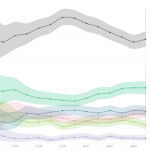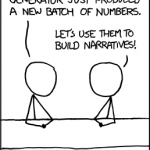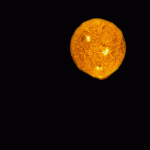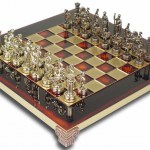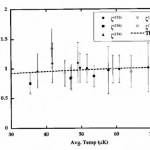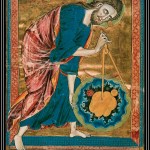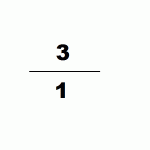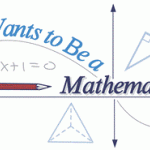math
Sonya Kovalevsky – Russian-born Mathematician
One of the world's best mathematicians of her era; established first major result in general theory of partial differential equations; first modern European woman appointed to full professorship; advocate of women's rights
Sonya Kovalevsky (also known as Sofia Kowalevski) was born in Russia in 1850 and became a noted mathematician in spite of a father who "had a horror of learned women," according to historical accounts. As a young woman, she could study math and physics only in secret. She married a man she did not love just to get away from her…
The other morning, I was lying in bed and for some reason, found myself wondering what the population of Niskayuna is. While this is easily Google-able, as I said, I was in bed, and didn't want to get up to get a device with Internet connectivity. So I tried to Fermi-problem my way to an answer using numbers I could come up with without opening my eyes.
The starting point for the estimate was the fact that SteelyKid's kindergarten class has 20-odd kids in it, and there are three kindergarten classes in her school. The school is one of five elementary schools that Niskayuna operates (Birchwood…
"If you look for truth, you may find comfort in the end; if you look for comfort you will not get either comfort or truth only soft soap and wishful thinking to begin, and in the end, despair." -C. S. Lewis
And yet, when you search for the truth, you often find answers that butt up against your sensibilities, your preconceptions, and even your very notions of common sense. Such is the case in this week's Ask Ethan, where longtime reader and commenter MandoZink asks:
I have a question that has perplexed me for most of my life. Recently I sought out and re-read more expert explanations of the…
After a couple of very productive days where I closed my Twitter tab because it was too freakin' annoying to read, I checked in briefly Wednesday morning, and found Rhett Allain and Frank Noschese discussing this Veritasium bullet-in-block experiment:
Tom at Swans On Tea offers some analysis, and Rhett offers a video response doing out some of the math:
I basically agree with their explanations, and that should have been that, except that in his discussion Rhett mentioned that the bullet probably doesn't go as far into the spinning block, which prompted Frank to ask whether you could…
There was some buzz Thursday about a poll showing that 40% of white people don't have any friends of a different race. Ipsos/Reuters include a spiffy "data explorer" where you can make graphs like the one above. It does not appear to provide an easy way to get at the actual wording of the question, which is kind of crucial, and thus renders most of the stories about it too vague to take all that seriously.
Of course, this is somewhat reminiscent of the gender bias story from a couple of weeks ago, where it was shown that single-gender physics departments are not a clear indication of sexism.…
After Thursday's post about sports and statistics, a friend from my Williams days, Dave Ryan, raised an objection on Facebook:
There's an unstated assumption (I think) in your analysis: that there is some intrinsic and UNALTERABLE statistical probability of getting a hit inherent in every hitter. If that is the case, then yes -- a hitter whose mean is .274 that hits .330 in the first half should, reasonably, be expected to regress towards the "true" outcome of .274 in the second half; and if the hitter winds up batting .330, it's a statistical outlier. But that ONLY applies if the underlying…
One of the chapters of the book-in-progress, as mentioned previously, takes the widespread use of statistics in sports as a starting point, noting that a lot of the techniques stat geeks use in sports are similar to those scientists use to share and evaluate data. The claim is that anyone who can have a halfway sensible argument about the relative merits of on-base-percentage and slugging percentage has the mental tools they need to understand some basic scientific data analysis.
I'm generally happy with the argument (if not the text-- it's still an early draft, and first drafts always suck…
It's been a really long time since I've done a Dorky Poll here, but I'm pretty fried at the moment, so here's a kind of mathematical personality test: two numbers that do not uniquely define a sequence, but suggest some possibilities that reveal your innate character type and/or appropriate career path:
Personality Test: What number should come next in this sequence: 101, 1001,...?
Feel free to offer arguments for your chosen answer in the comments, and/or to speculate about what the hidden meanings of the options are. I'll explain the logic some other time.
(This might be too abstract for a…
"By denying scientific principles, one can maintain any paradox." -Galileo Galilei
Day and night. It seems like the simplest, most natural thing about our world, that the Sun illuminates one half of the Earth at a time.
Image credit: Public Domain Image from Desktop Wallpaper HD.
While the Earth spins on its axis, orbiting the Sun, roughly half of our lives are spent bathed in the glorious daylight provided by our parent star. The other half is spent in the dark of night, our world illuminated only by the distant stars and galaxies visible from a great distance, along with a few nearby…
One of the reasons I held off on commenting on the whole E. O. Wilson math op-ed thing, other than not having time to blog, was that his comments were based on his own experiences. And, you know, who am I to gainsay the personal experiences of a justly famous scientist?
At the same time, though, this is one of the big things that makes the original piece so frustrating. He's speaking from his personal experience, but it feels like he's chosen to draw exactly the wrong lessons from it. The relevant anecdotes are:
During my decades of teaching biology at Harvard, I watched sadly as bright…
One of the hot topics of the moment is the E. O. Wilson op-ed lamenting the way math scares students off from science, and downplaying the need for mathematical skill (this is not news, really-- he said more or less the same thing a few years ago, but the Wall Street Journal published it to promote his upcoming book). This has raised a lot of hackles in the more math-y side of the science blogosphere, while some in less math-y fields (mostly closer to Wilson's home field of evolutionary biology) either applaud him or don't see what the fuss is about.
The split, I think, comes from the fact…
"There are some things we do much better than computers, but since most of chess is tactically based they do many things better than humans. And this imbalance remains. I no longer have any issues. It’s a bit like asking an astronomer, does he mind that a telescope does all the work?" -Vishy Anand
It used to be no contest. Even if a computer could perform million, billions, or trillions of calculations per second, a game like chess surely got too complicated too quickly for a computer to compete with humans. At least, that's what we used to think, but some things just don't stay the same, as…
Kate and I went down to New York City (sans kids, as my parents were good enough to take SteelyKid and The Pip for the weekend) this weekend, because Kate had a case to argue this morning, and I needed a getaway before the start of classes today. We hit the Rubin Museum of Art, which is just about the right size for the few hours we had, got some excellent Caribbean food at Negril Village, then saw The Old Man and the Old Moon in a church basement at NYU (the show was charming, the space was stiflingly hot by the end). All in all, a good weekend.
I drove back Sunday afternoon, and was…
Now that we've apparently elected Nate Silver the President of Science, this is some predictable grumbling about whether he's been overhyped. If you've somehow missed the whole thing, Jennifer Ouellette offers an excellent summary of the FiveThirtyEight saga, with lots of links, but the Inigo Montoya summing up is that Silver runs a blog predicting election results, which consistently showed Barack Obama with a high probability of winning. This didn't sit well with the pundit class, who mocked Silver in ways that made them look like a pack of ignorant yokels when Silver's projected electoral…
"Arithmetic! Algebra! Geometry! Grandiose trinity! Luminous triangle! Whoever has not known you is without sense!" -Comte de Lautréamont
When you think about it, it's amazing that our physical Universe makes sense at all. The fact that we can observe what's happening, determine the laws that govern it, and predict what will happen under the same or similar circumstances is the most remarkable power that science has. If that's what you're doing in any aspect of your life, congratulations, you are a scientist. But that doesn't tell us, fundamentally, what the Universe is like at its most basic…
"If a 'religion' is defined to be a system of ideas that contains unprovable statements, then Gödel taught us that mathematics is not only a religion, it is the only religion that can prove itself to be one." -John Barrow
Image credit: Codex Vindobonensis 2554 (French, ca. 1250), in the Österreichische Nationalbibliothek.
Image is from the front cover of the most important medieval picture bible to survive. But the caption is all my fault. Anyone can fool some of the people some of the time, but to enrage all of the people all of the time, that takes talent. Don't worry, I've got no future…
By Larry Bock
Founder and organizer, USA Science & Engineering Festival
The world runs on science and math, but let's face it, to get this across effectively to young students we sometimes have to get a little, well... messy.
No one knows this better than math and science author Sean Connolly who's gained a reputation with kids and teachers alike for breathing life into such potentially stuffy scientific tenets as Boyle's Law and Bernoulli's Principle through hands-on demonstrations and experiments that involve everything from potato guns and cola geysers to film-canister rockets and…
"Now go on, boy, and pay attention. Because if you do, someday, you may achieve something that we Simpsons have dreamed about for generations: you may outsmart someone!" -Homer Simpson
Today, March 14th, is known tongue-in-cheek as Pi Day here in the United States, as 3.14 (we write the month first) are the first three well-known digits to the famed number, π. As you know, it's the ratio of a perfect circle's circumference to its diameter.
Image credit: LeJyBy at Flickr Creative Commons, retrieved from sciencebuzz.org.
It's also very, very, very hard to calculate exactly, because it's…
America's most fast-paced and fun math contest will be the finale for day one of the 2012 USASEF. Eight area high school students will compete for $4000 in cash and prizes in Who Wants to Be a Mathematician on Saturday, April 28 at 5:00 on the Carver Stage. Students from DC, MD, VA, DE, and WV are eligible to compete. Teachers who are interested in having their students participate in the qualifying process should write paoffice@ams.org, with the subject line WWTBAM USASEF. Include your name, school, courses taught this semester, and phone number in the body of the message.
See descriptions…
"Every year I teach dozens of students at the University of Birmingham. Most of the students on the gender and sexuality courses are women. I guess this is because the boys don't think that gender applies to them: that it's a subject for girls."
-Louise Brown
You know the stereotype, perpetrated throughout the United States (and well beyond) for generations: girls aren't as good at math as boys are. For a long time, people pointed towards the long list of (almost exclusively male) mathematicians and scientists as support for this idea.
Image credit: Image Source/Getty Images, retrieved from…



